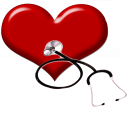WHAT DOES IT MEAN TO BE ON A HEART HEALTHY DIET?
 The benefit and the need for a heart healthy diet is certainly self explanatory. Guidelines for living on a heart healthy diet has significantly changed over the years. Although you might know that eating certain foods can increase your heart disease risk, it’s often tough to change your eating habits because you may not know what to change it to. It once was suggested to exclude all fats because fats was considered to be a huge contributor for poor heart health. Now, however, it is suggested that we include foods that have sources of unsaturated fats. These include foods such as avocados, nuts and seeds, and coconut oil. This is mainly due to the fact that all fats are not created equal and total restriction of fats can cause detrimental harm. It is also suggested that we refrain from foods with added sugars and refined carbohydrates such as sodas, desserts and foods made with white flour because it raises triglyceride levels, lowers HDL (happy) cholesterol levels and increases LDL (bad) cholesterol levels and it causes inflammation, all increasing your risk of a heart attack.
The benefit and the need for a heart healthy diet is certainly self explanatory. Guidelines for living on a heart healthy diet has significantly changed over the years. Although you might know that eating certain foods can increase your heart disease risk, it’s often tough to change your eating habits because you may not know what to change it to. It once was suggested to exclude all fats because fats was considered to be a huge contributor for poor heart health. Now, however, it is suggested that we include foods that have sources of unsaturated fats. These include foods such as avocados, nuts and seeds, and coconut oil. This is mainly due to the fact that all fats are not created equal and total restriction of fats can cause detrimental harm. It is also suggested that we refrain from foods with added sugars and refined carbohydrates such as sodas, desserts and foods made with white flour because it raises triglyceride levels, lowers HDL (happy) cholesterol levels and increases LDL (bad) cholesterol levels and it causes inflammation, all increasing your risk of a heart attack.
Now, just like fats, all carbs are not created equal. The goal is to choose the most nutritious carbohydrates -not to eliminate them completely. So, you might ask yourself, what is considered the most nutritious carbs? The answer to that would be fruits, beans, lentils, and whole grains (like oats, barley and brown rice).
The next piece of advice that we heard was to choose lean proteins. Today, the suggestion has shifted to include more plant proteins, like beans, lentils, nuts and seeds and whole soy in an attempt to consume more unsaturated fats.
The next piece of advice that is commonly known is to strictly limit dietary cholesterol. However, research has now revealed that dietary cholesterol intake has much less of an impact on blood cholesterol levels than the types of fats and carbohydrates consumed. New diet guidelines issued by the American Heart Association in 2013 state that there is insufficient evidence to determine whether lowering dietary cholesterol reduces LDL cholesterol levels. This means that most healthy people can enjoy high-cholesterol, but otherwise healthy, foods like shellfish in moderation or eat an egg a day without cause for concern. With that being said, there is still a bit of caution to be had because some studies show that people with type 2 diabetes who eat one or two eggs a day would have an increased risk of heart disease, so until we are clear, people with these concerns should just limit whole eggs until we know more.
Now, let’s talk lean proteins vs. plant proteins. Health organizations have long advised to choose lean proteins. These include skinless poultry, seafood, low fat dairy, and lean cuts of red meat. But now, the latest recommendation is leaning towards consuming more plant proteins. such as beans, lentils, nuts, and whole soy foods. These are also rich in fiber and reduces the risk of heart disease while also aiding in lowering cholesterol levels and blood pressure due to the adding of rich vitamins, minerals and phytonutrients.
Lastly, we are told to reduce sodium, and as that remains true, we should also pay attention to increasing potassium. Limiting sodium reduces blood pressure which is a major contributor to heart attacks and strokes. Still, potassium works to offset sodium’s effects by relaxing and widening blood vessels, which in turn would also help reduce blood pressure. Potassium is found in a variety of fruits and vegetables such as white beans, dark leafy greens, baked potatoes with the skin, dried apricots and baked acorn squash.
So, now that you know the greatest and latest as it pertains to implementing a heart healthy diet, I hope you begin to incorporate these suggestions into your everyday living and remember don’t stress about it.



August 9, 2016
A HEART HEALTHY DIET
WHAT DOES IT MEAN TO BE ON A HEART HEALTHY DIET?
Now, just like fats, all carbs are not created equal. The goal is to choose the most nutritious carbohydrates -not to eliminate them completely. So, you might ask yourself, what is considered the most nutritious carbs? The answer to that would be fruits, beans, lentils, and whole grains (like oats, barley and brown rice).
The next piece of advice that we heard was to choose lean proteins. Today, the suggestion has shifted to include more plant proteins, like beans, lentils, nuts and seeds and whole soy in an attempt to consume more unsaturated fats.
The next piece of advice that is commonly known is to strictly limit dietary cholesterol. However, research has now revealed that dietary cholesterol intake has much less of an impact on blood cholesterol levels than the types of fats and carbohydrates consumed. New diet guidelines issued by the American Heart Association in 2013 state that there is insufficient evidence to determine whether lowering dietary cholesterol reduces LDL cholesterol levels. This means that most healthy people can enjoy high-cholesterol, but otherwise healthy, foods like shellfish in moderation or eat an egg a day without cause for concern. With that being said, there is still a bit of caution to be had because some studies show that people with type 2 diabetes who eat one or two eggs a day would have an increased risk of heart disease, so until we are clear, people with these concerns should just limit whole eggs until we know more.
Now, let’s talk lean proteins vs. plant proteins. Health organizations have long advised to choose lean proteins. These include skinless poultry, seafood, low fat dairy, and lean cuts of red meat. But now, the latest recommendation is leaning towards consuming more plant proteins. such as beans, lentils, nuts, and whole soy foods. These are also rich in fiber and reduces the risk of heart disease while also aiding in lowering cholesterol levels and blood pressure due to the adding of rich vitamins, minerals and phytonutrients.
Lastly, we are told to reduce sodium, and as that remains true, we should also pay attention to increasing potassium. Limiting sodium reduces blood pressure which is a major contributor to heart attacks and strokes. Still, potassium works to offset sodium’s effects by relaxing and widening blood vessels, which in turn would also help reduce blood pressure. Potassium is found in a variety of fruits and vegetables such as white beans, dark leafy greens, baked potatoes with the skin, dried apricots and baked acorn squash.
So, now that you know the greatest and latest as it pertains to implementing a heart healthy diet, I hope you begin to incorporate these suggestions into your everyday living and remember don’t stress about it.